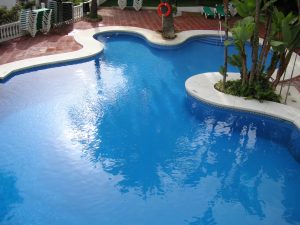Do you have dreams of the perfect pool? Many people do, but when you’re ready to take that first step toward turning the dream into a reality, you’re going to develop some very real questions. How much does it really cost? What kinds of features are available? How long will it last?
That last question comes up a lot, so we thought we would take a minute to address it. The truth is that several factors can dramatically affect the answer, such as:
- How often you use the pool
- How well you maintain the pool
- The pool equipment you use
- The materials used to build the pool
This blog will address the last factor, but keep in mind that any of the other factors (and many more) can extend or reduce the longevity of your pool. Here are some basic guidelines for how long you can expect your pool to last before needing restoration.
The Longevity of Concrete Pools
Pools can be made out of a few different materials, but by and large, in-ground pools are made from concrete. More specifically, modern pools are usually made from gunite. Gunite is a variation on concrete that is best defined by the way it is applied, which is via spraying.
A gunite pool will last for a very long time. Manufacturers of the material usually warranty it for 20 years, but in reality, gunite has an indefinite lifespan. There are plenty of pools that are pushing 100 years made from this material, and no one is really sure how long it can last.
The pool itself is pretty much forever. Instead, it’s the surface that doesn’t last as long. You can get a lot of different surfaces on your gunite, and each has its own lifespan. We’ll cover the common surfaces in a moment, but no matter what you choose, the pool will eventually need to be resurfaced.
Tiles
Typically, all-tile pools last between 5 and 10 years before missing grout and loose tiles need to be addressed. The biggest factor related to the longevity of an all-tile pool is how well chemistry is monitored, but in tile pools, it can be the most important factor. Poor chemistry, low on the saturation index, will cause pool water to eat away at grout joints and then to loosen the tiles themselves.
Tile is a more expensive choice than most finishes, but it’s the very best when you want a variety of aesthetic options. You can do mosaics or choose designs with tiles. You can mix and match colors. In general, you get more freedom in the look of your pool with tile if you’re willing to pay a significant premium. Astronomically high pricing and a slick surface are just two reasons why a very select number of people choose all-tile pool surfaces.
Paint
Pool paint has fallen out of popularity mostly because it only lasts two to five years. No one wants to drain their pool every other year for painting. In fact, many experts recommend avoiding paint because of this issue, and you can expect the long-term costs of paint to be much higher than most other finishes. Worst of all, when the paint starts to fail, it can dissolve into the water, which is hard on your filters and makes pool maintenance very challenging.
Plaster
Plaster is pretty much the gold standard for pool finishes. It typically lasts 15 to 25 years, and you can get plaster in a fairly wide range of colors. Plaster is the texture you most likely associate with in-ground pools because it is so popular. It’s nontoxic, safe, and easy to work with. Plaster can also be repaired when minor damage occurs, although any repairs made to any plaster surfaces will certainly look patchy; no one can match existing plaster.
All in all, plaster is the most frequently recommended pool finish for a lot of reasons. When it comes to long-term maintenance, pool owners who opt for plaster would tell you that pools last an average of 10 years before the surface, whether quartz or pebble or plain white plaster, begins to erode under the consistent chemistry and sanitization of pool water. At about this point in the plaster surface’s lifespan, things will go from okay to terrible much more quickly. Terrible is a surface that needs sand blast or water blast operations in order for the new surface and bond coat to adhere to the old.
No matter what type of pool finish you like, you’ll eventually need to get it restored. When that time comes, contact Select Pool Services. We renovate pools throughout the North Dallas area. All you have to do to get started is call or fill out our online contact form.





No comments yet.